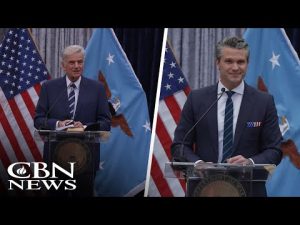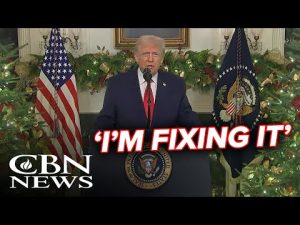**Unmasking Washington’s Game: The Pete Hegseth Confirmation Saga**
In the whirlwind world of politics, confirmation hearings can often feel like a high-stakes game of chess, with nominees facing unexpected challenges just as they are about to take a seat at the executive table. Currently in the spotlight is Pete Hegseth, nominated by former President Donald Trump for the position of Secretary of Defense. In a plot twist that could rival any political thriller, Hegseth is facing a barrage of allegations—ranging from sexual assault to alcohol abuse—that many conservatives believe are part of a larger deep-state play aimed at derailing his confirmation.
The Heritage Foundation’s President, Kevin Roberts, has been vocal about his concerns, suggesting that these last-minute allegations are indeed the handiwork of the deep state—an invisible foe lurking in the shadows of Washington, D.C. According to Roberts, this tactic is a classic maneuver used against nominees who threaten the status quo. With Hegseth promising much-needed reform to the Pentagon, it is no wonder the usual suspects are worried. Roberts encourages Senate Republicans to stand firm against this onslaught and confirm Hegseth for the sake of American security.
Confirmation hearings are intended to allow the Senate to provide advice and consent on presidential appointments—a crucial aspect of our government designed to ensure accountability. Unfortunately, as Roberts pointed out, these hearings have, more often than not, devolved into nothing more than political theater. Instead of a straightforward discussion on qualifications and policies, senators sometimes opt for lengthy monologues that serve only to bolster their political agendas, leaving nominees in the lurch. This pattern can disrupt the noble purpose behind these hearings and lead to a climate of suspicion and distrust.
As it stands, Hegseth managed to advance on a procedural vote, edging a bit closer to confirmation. Although a few senators voted against him, an unexpected “yes” from Mitch McConnell raised eyebrows in some circles. The clock is ticking, and the stakes are high. Expectations run high that Hegseth could see a confirmation vote soon, possibly paving the way for ambitious reforms to modernize the Pentagon in line with American interests rather than globalist agendas.
This drama mirrors previous Capitol Hill battles, like those seen during the contentious confirmation of Brett Kavanaugh. The deep state strategy often involves subtle attacks, daring nominees to defend themselves against shifting accusations. Instead of engaging in transparent debate about policy differences, opponents resort to a passive-aggressive lexicon, avoiding a forthright discussion on their disagreements. This behavior frustrates both the nominees and the American public, who are left wondering about the values and priorities driving what should be a straightforward confirmation process.
So, what can be done to improve this spectacle? According to commentators, the first step towards reshaping the confirmation landscape lies in effective leadership—an element that seems to be emerging under recent conservative movements. The call to action is clear: the American people must remain vigilant and engaged. As they become more informed about the inside workings of Washington, they can apply pressure on their elected officials to prioritize the country’s safety and well-being over political gamesmanship. By demanding accountability and reform, everyday citizens can be the driving force behind the changes they want to see in their government.
In conclusion, the Hegseth confirmation saga not only serves as a reminder of the challenges nominees face but also highlights a larger battle over the future direction of the government. With Americans waking up to the shenanigans occurring behind closed doors, there’s a glimmer of hope that daylight might just be breaking through on the political horizon. After all, who knew that confirmation hearings could be as engaging as any prime-time drama? As the curtain rises on this latest act, one thing is clear: the stakes have never been higher, and the outcome could determine the course of American policy for years to come.







